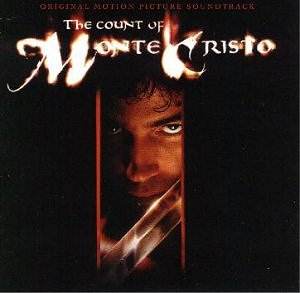Ed SHEARMUR
The Count of Monte Cristo
OST
BMG RCA Victor 09026 63865 2 [53:00]

The ‘Introduction’ is a dark, dramatic choral piece, a device also used to open Michael Kamen’s The Three Musketeers, but in much the same way this is misleading in musical terms as what follows is more melodic and sprightly, as indicated by the frenetic energy of ’Landing on Elba’. The score’s central theme is first introduced in ‘Marseille’, a pleasing motif that reappears at the conclusion of the effectively austere ‘Escape From the Island’, as well as in low-key, emotional form on ‘After the Party’ and in a more sumptuous version on the ‘End Titles’. Beyond this there are several sturdy atmospheric cues like ‘Betrayed’ and ‘Chateau D’If’ and generally speaking the emphasis is more on suspense rather than action, although there are of course occasional bursts of adrenaline on ‘Finding the Treasure’ and ‘Involving Albert’, plus the lively gaiety of ‘An Invitation to the Ball’.
With this accomplished score Ed Shearmur continues to establish himself as an intelligent, gifted composer quite capable of rising to the top ranks. Although at times he does sound reminiscent of several leading practitioners of the art of film music, he cleverly manages to create something fresh from amidst these influences and there is enough versatility and verve in his approach to keep things interesting.
An entertaining, melodic work with much to recommend it.
Mark Hockley

Gary S. Dalkin adds -
From the dark and menacing choral grandeur over slow building percussion of the opening "Landing on Elba", rather more than a period adventure such as The Count of Monte Christo, Edward Shearmur's score suggests a stark foreboding akin to Elliot Goldenthal's Alien3. Moments of such brooding atmospherics continue to arise through a score - most of "Chateau D'If" could be an outtake from the science fiction film - which as it settles down does become more in the expected romantic vein, the portrait of "Marseille" having a similar autumnal-impressionistic character to much of the composer's score for The Wings of the Dove. That said, the opening of "Abbe Feria" sounds startlingly like music from Jerry Goldsmith's original Alien score, and one wonders what was used to temp track this movie -the remainder of the piece then unfolds as a gentle dance-like theme for harp. Elsewhere there is an urgent balletic quality to the brief "Edmond's Education" and a playfully angular drive to "Training Montage". Cues such as "Betrayed" enable Shearmur to combine rhythmically propulsive suspense underscoring with an explosion of brassy fire in the grand Hollywood tradition and more modernistic colours, which are either electronic or achieved by unusual instrumental techniques. The booklet is silent regarding the use of synthesisers and samplers and likewise it fails to mention any choir.
A score which becomes more impressive with repeated playing, this is a long way removed from the swashbuckling adventure one might expect, with even the finale, "Retribution" offering far more suspenseful enquiry than outright explosiveness. The overriding impression I am left with is that anyone who enjoyed Trevor Jones music for From Hell might find this worth investigating, and that Edward Shearmur should be put on the shortlist of candidates to score the next Alien movie. His fine "End Titles" even have a similar calm triumph to that Goldsmith brought to the conclusion of the original entry in the series.
Gary S Dalkin

Return to Index